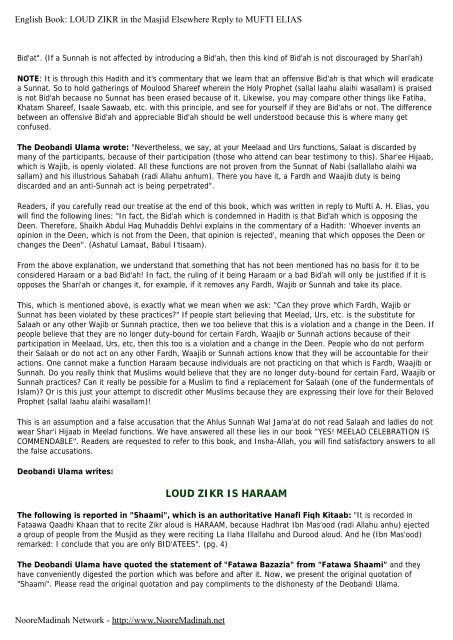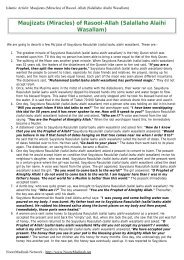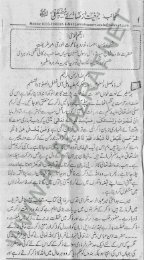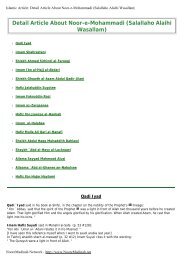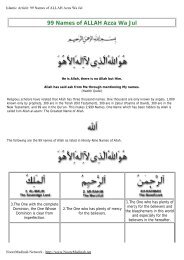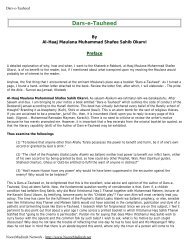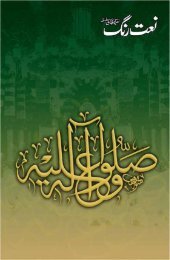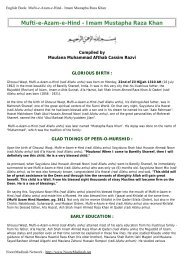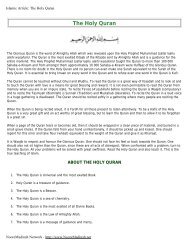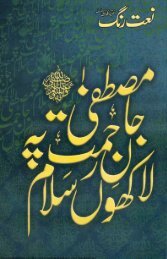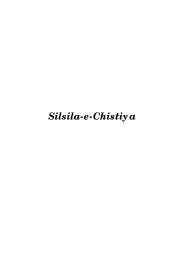LOUD ZIKR in the Masjid & Elsewhere & Reply to MUFTI ELIAS
LOUD ZIKR in the Masjid & Elsewhere & Reply to MUFTI ELIAS
LOUD ZIKR in the Masjid & Elsewhere & Reply to MUFTI ELIAS
Create successful ePaper yourself
Turn your PDF publications into a flip-book with our unique Google optimized e-Paper software.
English Book: <strong>LOUD</strong> <strong>ZIKR</strong> <strong>in</strong> <strong>the</strong> <strong>Masjid</strong> <strong>Elsewhere</strong> <strong>Reply</strong> <strong>to</strong> <strong>MUFTI</strong> <strong>ELIAS</strong><br />
Bid'at". (If a Sunnah is not affected by <strong>in</strong>troduc<strong>in</strong>g a Bid'ah, <strong>the</strong>n this k<strong>in</strong>d of Bid'ah is not discouraged by Shari'ah)<br />
NOTE: It is through this Hadith and it's commentary that we learn that an offensive Bid'ah is that which will eradicate<br />
a Sunnat. So <strong>to</strong> hold ga<strong>the</strong>r<strong>in</strong>gs of Moulood Shareef where<strong>in</strong> <strong>the</strong> Holy Prophet (sallal laahu alaihi wasallam) is praised<br />
is not Bid'ah because no Sunnat has been erased because of it. Likewise, you may compare o<strong>the</strong>r th<strong>in</strong>gs like Fatiha,<br />
Khatam Shareef, Isaale Sawaab, etc. with this pr<strong>in</strong>ciple, and see for yourself if <strong>the</strong>y are Bid'ahs or not. The difference<br />
between an offensive Bid'ah and appreciable Bid'ah should be well unders<strong>to</strong>od because this is where many get<br />
confused.<br />
The Deobandi Ulama wrote: "Never<strong>the</strong>less, we say, at your Meelaad and Urs functions, Salaat is discarded by<br />
many of <strong>the</strong> participants, because of <strong>the</strong>ir participation (those who attend can bear testimony <strong>to</strong> this). Shar'ee Hijaab,<br />
which is Wajib, is openly violated. All <strong>the</strong>se functions are not proven from <strong>the</strong> Sunnat of Nabi (sallallaho alaihi wa<br />
sallam) and his illustrious Sahabah (radi Allahu anhum). There you have it, a Fardh and Waajib duty is be<strong>in</strong>g<br />
discarded and an anti-Sunnah act is be<strong>in</strong>g perpetrated".<br />
Readers, if you carefully read our treatise at <strong>the</strong> end of this book, which was written <strong>in</strong> reply <strong>to</strong> Mufti A. H. Elias, you<br />
will f<strong>in</strong>d <strong>the</strong> follow<strong>in</strong>g l<strong>in</strong>es: "In fact, <strong>the</strong> Bid'ah which is condemned <strong>in</strong> Hadith is that Bid'ah which is oppos<strong>in</strong>g <strong>the</strong><br />
Deen. Therefore, Shaikh Abdul Haq Muhaddis Dehlvi expla<strong>in</strong>s <strong>in</strong> <strong>the</strong> commentary of a Hadith: 'Whoever <strong>in</strong>vents an<br />
op<strong>in</strong>ion <strong>in</strong> <strong>the</strong> Deen, which is not from <strong>the</strong> Deen, that op<strong>in</strong>ion is rejected', mean<strong>in</strong>g that which opposes <strong>the</strong> Deen or<br />
changes <strong>the</strong> Deen". (Ashatul Lamaat, Babul I'tisaam).<br />
From <strong>the</strong> above explanation, we understand that someth<strong>in</strong>g that has not been mentioned has no basis for it <strong>to</strong> be<br />
considered Haraam or a bad Bid'ah! In fact, <strong>the</strong> rul<strong>in</strong>g of it be<strong>in</strong>g Haraam or a bad Bid'ah will only be justified if it is<br />
opposes <strong>the</strong> Shari'ah or changes it, for example, if it removes any Fardh, Wajib or Sunnah and take its place.<br />
This, which is mentioned above, is exactly what we mean when we ask: "Can <strong>the</strong>y prove which Fardh, Wajib or<br />
Sunnat has been violated by <strong>the</strong>se practices?" If people start believ<strong>in</strong>g that Meelad, Urs, etc. is <strong>the</strong> substitute for<br />
Salaah or any o<strong>the</strong>r Wajib or Sunnah practice, <strong>the</strong>n we <strong>to</strong>o believe that this is a violation and a change <strong>in</strong> <strong>the</strong> Deen. If<br />
people believe that <strong>the</strong>y are no longer duty-bound for certa<strong>in</strong> Fardh, Waajib or Sunnah actions because of <strong>the</strong>ir<br />
participation <strong>in</strong> Meelaad, Urs, etc, <strong>the</strong>n this <strong>to</strong>o is a violation and a change <strong>in</strong> <strong>the</strong> Deen. People who do not perform<br />
<strong>the</strong>ir Salaah or do not act on any o<strong>the</strong>r Fardh, Waajib or Sunnah actions know that <strong>the</strong>y will be accountable for <strong>the</strong>ir<br />
actions. One cannot make a function Haraam because <strong>in</strong>dividuals are not practic<strong>in</strong>g on that which is Fardh, Waajib or<br />
Sunnah. Do you really th<strong>in</strong>k that Muslims would believe that <strong>the</strong>y are no longer duty-bound for certa<strong>in</strong> Fard, Waajib or<br />
Sunnah practices? Can it really be possible for a Muslim <strong>to</strong> f<strong>in</strong>d a replacement for Salaah (one of <strong>the</strong> fundermentals of<br />
Islam)? Or is this just your attempt <strong>to</strong> discredit o<strong>the</strong>r Muslims because <strong>the</strong>y are express<strong>in</strong>g <strong>the</strong>ir love for <strong>the</strong>ir Beloved<br />
Prophet (sallal laahu alaihi wasallam)!<br />
This is an assumption and a false accusation that <strong>the</strong> Ahlus Sunnah Wal Jama'at do not read Salaah and ladies do not<br />
wear Shar'i Hijaab <strong>in</strong> Meelad functions. We have answered all <strong>the</strong>se lies <strong>in</strong> our book "YES! MEELAD CELEBRATION IS<br />
COMMENDABLE". Readers are requested <strong>to</strong> refer <strong>to</strong> this book, and Insha-Allah, you will f<strong>in</strong>d satisfac<strong>to</strong>ry answers <strong>to</strong> all<br />
<strong>the</strong> false accusations.<br />
Deobandi Ulama writes:<br />
<strong>LOUD</strong> <strong>ZIKR</strong> IS HARAAM<br />
The follow<strong>in</strong>g is reported <strong>in</strong> "Shaami", which is an authoritative Hanafi Fiqh Kitaab: "It is recorded <strong>in</strong><br />
Fataawa Qaadhi Khaan that <strong>to</strong> recite Zikr aloud is HARAAM, because Hadhrat Ibn Mas'ood (radi Allahu anhu) ejected<br />
a qroup of people from <strong>the</strong> Musjid as <strong>the</strong>y were recit<strong>in</strong>g La Ilaha Illallahu and Durood aloud. And he (Ibn Mas'ood)<br />
remarked: I conclude that you are only BID'ATEES". (pg. 4)<br />
The Deobandi Ulama have quoted <strong>the</strong> statement of "Fatawa Bazazia" from "Fatawa Shaami" and <strong>the</strong>y<br />
have conveniently digested <strong>the</strong> portion which was before and after it. Now, we present <strong>the</strong> orig<strong>in</strong>al quotation of<br />
"Shaami". Please read <strong>the</strong> orig<strong>in</strong>al quotation and pay compliments <strong>to</strong> <strong>the</strong> dishonesty of <strong>the</strong> Deobandi Ulama.<br />
NooreMad<strong>in</strong>ah Network - http://www.NooreMad<strong>in</strong>ah.net


